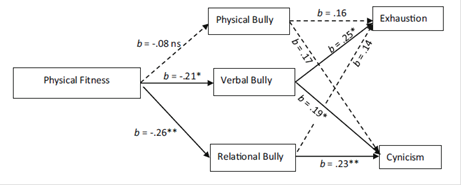Yuanpei Cai, the old president of Peking University and the famous educational thinker, put forward the educational thought of “Five Educations”, including moral, intellectual, physical, aesthetic, and labor education. What change can physical education, the base of modern education, bring to children?
Although previous research explored the biological, cognitive, and emotional changes that physical activity and physical fitness bring to us, these research mainly explored the impact from the individual perspective. Based on the body-mind unity theory and “Cross-Stressor-Adaptation” hypothesis (Sothmann et al., 1996), this research explored how physical fitness influences academic burnout from an interpersonal perspective.
Interpersonal bullying is more and more common in the news of elementary and middle school students, which affects students’ life and learning performance. Children with stronger physical fitness are less likely to suffer from peer verbal bullying and relational bullying, due to their better stress adaptation and response systems achieve from exercise. These students show better social functioning and social adaptation, which leads to less academic burnout and better psychological health.

On May 27th, 2021, a new study of “How physical fitness influences academic burnout in elementary students: An interpersonal perspective” was published in Current Psychology by Dr. Jiajin Tong, assistant professor of School of Psychological and Cognitive Sciences, Peking University. This research received financial support from the Foundation of Beijing Key Laboratory of Behavior and Mental Health.
Research Link: https://links.springer.com/article/10.1007/s12144-021-01948-5
Tong, J., Zhang, Z., Chen, W., He, Z.*, & Yang, X.* (2021). How physical fitness influences academic burnout in elementary students: An interpersonal perspective. Current Psychology. DOI: 10.1007/s12144-021-01948-5


